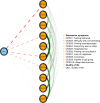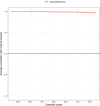Prevalence of depression and its network structure and association with quality of life in older adults with hypertension: findings of a national survey
- PMID: 40254546
- PMCID: PMC12009786
- DOI: 10.1111/psyg.70034
Prevalence of depression and its network structure and association with quality of life in older adults with hypertension: findings of a national survey
Abstract
Introduction: Based on the Chinese Longitudinal Healthy Longevity Survey (CLHLS), this study aimed to examine the prevalence and correlates of depression, and its network structure and association with quality of life (QOL) in older adults with hypertension.
Methods: Depression and QOL were measured using the 10-item Center for Epidemiologic Studies Short Depression Scale (CESD-10) and the World Health Organization Quality of Life-brief version, respectively. Univariable and multivariable analyses were performed. Network analysis was used to explore the interconnections between depressive symptoms. The flow function was used to identify depressive symptoms that were directly associated with QOL.
Results: A total of 5032 older adults with hypertension were included. The prevalence of depression (CESD-10 total score ≥ 10) was 28.3% (95% confidence interval: 27.08%-29.59%), which was significantly associated with poor QOL (P < 0.001). Participants who were male (P < 0.001), resided in urban areas (P = 0.006), lived with their family (P < 0.001), had perceived fair or good economic status (P < 0.001), and higher level of instrumental activities of daily living (P < 0.001) had lower risk of depression. In the network model of depression, CESD3 'Feeling blue/depressed', CESD4 'Everything was an effort' and CESD8 'Loneliness' were the most central symptoms. CESD10 'Sleep disturbances' had the highest negative association with QOL, followed by CESD5 'Hopelessness', and CESD7 'Lack of happiness'.
Conclusion: Depression was common among older adults with hypertension and significantly associated with poor QOL. To prevent and reduce the negative impact of depression in this population, appropriate interventions should target both central symptoms and the depressive symptoms associated with QOL.
Keywords: depression; hypertension; network analysis; older adults; quality of life.
© 2025 The Author(s). Psychogeriatrics published by John Wiley & Sons Australia, Ltd on behalf of Japanese Psychogeriatric Society.
Figures
Similar articles
-
Prevalence and network structure of depression and its association with quality of life among older stroke survivors: findings from a national survey in China.Gen Psychiatr. 2025 Apr 17;38(2):e101838. doi: 10.1136/gpsych-2024-101838. eCollection 2025. Gen Psychiatr. 2025. PMID: 40271079 Free PMC article.
-
Inter-relationship between cognitive performance and depressive symptoms and their association with quality of life in older adults: A network analysis based on the 2017-2018 wave of Chinese Longitudinal Healthy Longevity Survey (CLHLS).J Affect Disord. 2023 Jan 1;320:621-627. doi: 10.1016/j.jad.2022.09.159. Epub 2022 Oct 5. J Affect Disord. 2023. PMID: 36206885
-
Inter-relationships of depression and anxiety symptoms among widowed and non-widowed older adults: findings from the Chinese Longitudinal Healthy Longevity Survey based on network analysis and propensity score matching.Front Public Health. 2025 Mar 12;13:1495284. doi: 10.3389/fpubh.2025.1495284. eCollection 2025. Front Public Health. 2025. PMID: 40144982 Free PMC article.
-
Network analysis of depression and anxiety symptoms and their associations with life satisfaction among Chinese hypertensive older adults: a cross-sectional study.Front Public Health. 2024 Mar 18;12:1370359. doi: 10.3389/fpubh.2024.1370359. eCollection 2024. Front Public Health. 2024. PMID: 38562253 Free PMC article.
-
Inter-relationships of depression and insomnia symptoms with life satisfaction in stroke and stroke-free older adults: Findings from the Health and Retirement Study based on network analysis and propensity score matching.J Affect Disord. 2024 Jul 1;356:568-576. doi: 10.1016/j.jad.2024.04.036. Epub 2024 Apr 11. J Affect Disord. 2024. PMID: 38608767
References
-
- World Health Organization . Depression, 2016. Retrieved from https://www.who.int/health-topics/depression/#tab=tab_1.
MeSH terms
Grants and funding
- 821QN249/Hainan Provincial Natural Science Foundation of China
- Hnjg2024ZC-55/the Education Department of Hainan Province
- Discipline Backbone-01-028/Beijing High Level Public Health Technology Talent Construction Project
- Z181100001518005/the Beijing Municipal Science & Technology Commission
- CFH2024-2-1174/the Capital's Funds for Health Improvement and Research
LinkOut - more resources
Full Text Sources
Medical




